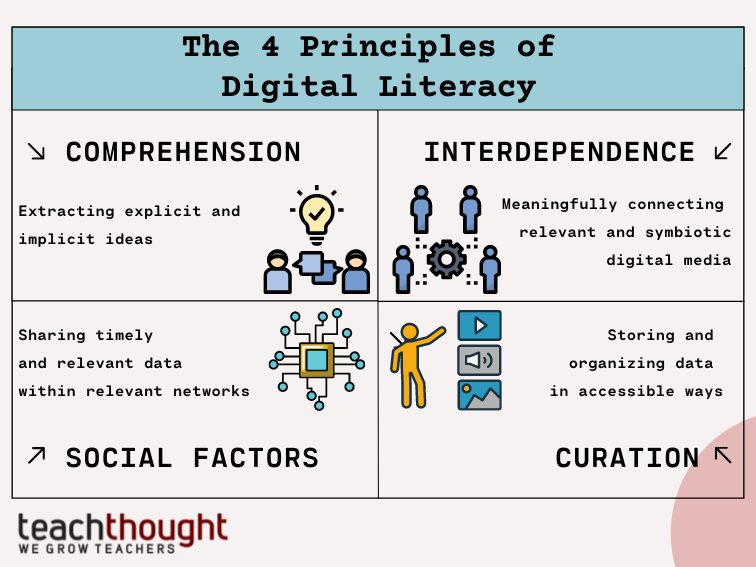
What Are The Principles Of Digital Literacy?
by Terry Heick
Literacy
Literacy is the ability to make sense of something, often generalized as the ability to read and write. In many ways, reading is reading, media is media, but in the same way a play places unique comprehension demands on a reader compared to a poem or a letter, so do digital media compared to classic media forms. In the 21st century, new literacies are emerging and digital media forms allow communication to be more nuanced than ever before.
Digital Literacy
Digital Literacy is about being able to make sense of digital media. This occurs through meaningful and sustainable consumption and curation patterns that improve an individuals potential to contribute to an authentic community. This includes the ability to analyze, prioritize, and act upon the countless digital media 21st century citizens encounter on a daily basis.
4 Principles Of Digital Literacy
1. Comprehension
The first principle of digital literacy is simply comprehension–the ability to extract implicit and explicit ideas from a media.
2. Interdependence
The second principle of digital literacy is interdependence–how one media form connects with another, whether potentially, metaphorically, ideally, or literally. Little media is created with the purpose of isolation, and publishing is easier than ever before. Due to the sheer abundance of media, it is necessary that media forms not simply co-exist, but supplement one another.
3. Social Factors
Sharing is no longer just a method of personal identity or distribution, but rather can create messages of its own. Who shares what to whom through what channels can not only determine the long-term success of the media, but can create organic ecosystems of sourcing, sharing, storing, and ultimately repackaging media.
4. Curation
Speaking of storing, overt storage of favored content through platforms such as pinterest, pearltrees, pocket and others is one method of “save to read later.” But more subtly, when a video is collected in a YouTube channel, a poem ends up in a blog post, or an infographic is pinned to pinterest or stored on a learnist board, that is also a kind of literacy as well–the ability to understand the value of information, and keep it in a way that makes it accessible and useful long-term.
Elegant curation should resist data overload and other signs of “digital hoarding,” while also providing the potential for social curation–working together to find, collect, and organize great information.

